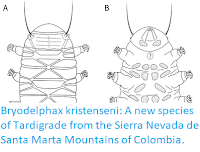Tardigrades, or Water Bears, are a distinctive group of small (usually
less than 1 mm) invertebrates related to Arthropods, Nematodes and
Velvet Worms. They have a simple segmented body with four pairs of
limbs, and are remarkably resilient to environmental stress, being able
to withstand extremely high and low temperatures, complete desiccation
and even exposure to vacuum. To date about 1200 species of Tardigrade
have been described, from marine, freshwater and terrestrial
environments. Of these 167 have been recorded in Japan, including 26 species first described from the nation.
In a paper published in the journal PLoS One on 28 February 2018, Daniel Stec of the Institute of Zoology and Biomedical Research at Jagiellonian University, Kazuharu Arakawa of the Institute for Advanced Biosciences at Keio University, and Łukasz Michalczyk, also of the Institute of Zoology and Biomedical Research at Jagiellonian University, describe a new species of Tardigrade from Yamagata Prefecture in Japan.
The new species is placed in the genus Macrobiotus and given the specific name shonaicus, in reference to the Shōnai Region of Yamagata Prefecture, where it was discovered. Adults of this species range from 318 to 743 μm in length and are yellowish in colour, whereas juveniles are white. This species has a granular surface on its limbs, slender claws and three bands of teeth.
Macrobiotus shonaicus. (A) Specmen in dorso-ventral projection (preserved in Hoyer's medium, and imaged using phase contrast light microscopy); (B) specimen in dorsal view Scanning Electron Microscope image). Scale bars in μm. Stec et al. (2018).
See also...
Follow Sciency Thoughts on
Facebook.







